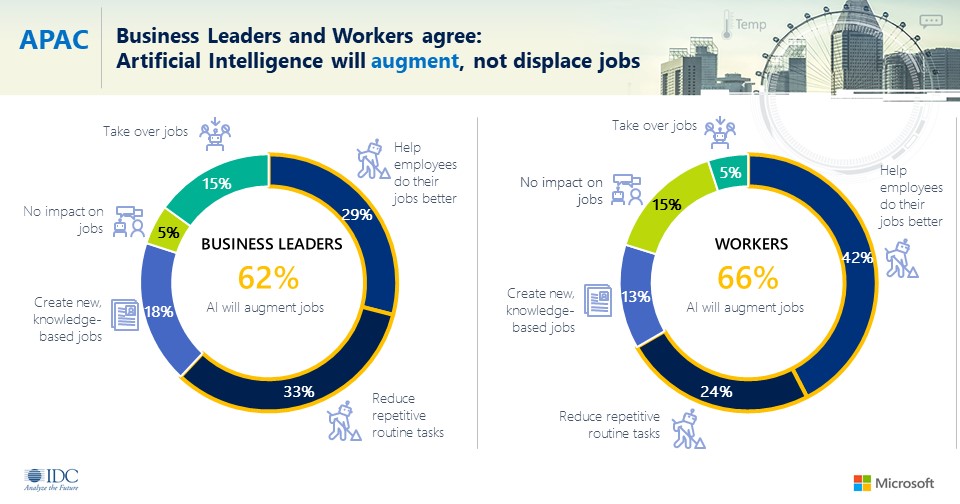By Ralph Haupter, President, Microsoft Asia.
 How will AI affect my workforce? How do I attract and develop the best talent? How do I augment and digitally upskill my employees?
How will AI affect my workforce? How do I attract and develop the best talent? How do I augment and digitally upskill my employees?
These are questions I often hear as I travel around Asia Pacific and meet senior business leaders. The topic of talent development is always the first thing on everyone’s mind.
My answer involves “tech intensity”. Put simply, tech intensity is an organization’s level of tech adoption multiplied by its level of tech capabilities. Tech intensity sets the stage for future growth, innovation and breakthroughs, at a much quicker pace. .A digitally skilled workforce is critical to tech intensity, especially as AI becomes more prevalent in the region.
AI opportunities
The emergence of AI in Asia Pacific presents a unique opportunity for many people in the region. Existing and upcoming technological developments have the capacity to radically alter businesses and industries. This means that millions of people will have the chance to transform themselves into the skilled and talented learners that future needs.
To seize this moment, organizations absolutely have to create cultures where technology blends with human potential. This is where the magic really happens.
And it’s why I’m very excited about our recent partnership throughout the region with the super app, Grab, and the opportunities it’s going to provide in many of Grab’s markets.
Grabbing the future
The collaboration is bigger than Microsoft and Grab. It will open new upskilling paths for millions of people across Southeast Asia. This is why I am excited about this partnership with Grab, which is about upskilling of their drivers, merchant-partners, as well as their families.
Together, we’ve already started a tech talent development initiative, based on academic partnerships with universities in Indonesia, Vietnam and Singapore, to enhance core skills and tools for people just entering the workforce.
Students are just the beginning. We’re also creating avenues for drivers with little to no tech background, as well as their children, to learn digital skills and become more employable. In today’s digital economy we feel it’s important to ensure that everyone has realistic pathways to participate in the opportunities in the tech industry.
To that end, Microsoft Digital Literacy curricula in local languages will become available for all Grab drivers and their families. They will start their learning journeys with foundational tech knowledge, and hopefully many of them will continue by getting more advanced in-demand skills, such as data science and cybersecurity.
We can’t wait to see people currently in the gig economy transition into knowledge-based and higher-paid types of jobs, both within Grab as well as in the Microsoft ecosystem. That’s the true embodiment of tech intensity.
Skills for everyone
At Microsoft, we see a huge opportunity to close the skills gap and enhance employability across the region. We firmly believe that digital skills should be for everyone, and that companies that create technology should accept a greater responsibility for the future.
As leaders in this sector, we have a collective role to empower individuals across all demographics with the knowledge and experience they need to succeed in an AI-enabled world.
Business leaders and workers in Asia Pacific view AI as a driver for augmenting the workforce that will not only help to reduce mundane work and do jobs better, but will also create new knowledge-based jobs in the future (according to a Microsoft-IDC “Future Ready Business: Assessing Asia’s Growth Potential Through AI” study).
However, we must do more to make this a reality. We urge organizations across Asia Pacific to accelerate their efforts to reimagine work and upskill their workers at all levels. We are ready to partner with more organizations in the future to help them do so.
In the AI era, everyone – at all levels, in all roles, and especially from all cultures and walks of like – needs to be equipped with tools and skills to be future-ready. This challenge is larger than one company. So by joining forces, we can maximize each other’s social impact and achieve more.
Both Microsoft and Grab are part of the World Economic Forum’s Digital ASEAN initiative, which has pledged to help equip 20 million people in Southeast Asia with digital skills by 2020. And our partnership represents a great start to reaching that goal.
What’s next?
At Microsoft, we strongly believe that for technologies like AI to have a truly transformative effect on the workplace, we need to involve as diverse a range of people as possible and provide opportunities for upskilling and growth at every angle of the economy and community.
The growth and digital ambitions of organizations in Asia, need to be met with tech intensity, to enable both access technology like AI and the capabilities to use and benefit from it. What’s the point of owning a car without a driver’s license, right?
The partnership we’ve just announced with Grab is one example of how we see reskilling as a way to provide new opportunities. We hope that it will be a model for future collaborations from many other industries and sectors as they all look to increase their tech intensity and end results. And we are keen to collaborate with like-minded organizations in the region to address the demand for new skills.
No matter what role any of us play in the current or future workforce in Asia Pacific, our jobs will ultimately be impacted by the amazing effects AI is already having in organizations all over the region. I truly believe that by preparing for and embracing that future, this region will continue to grow and develop for the benefit of everyone.








